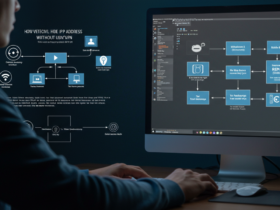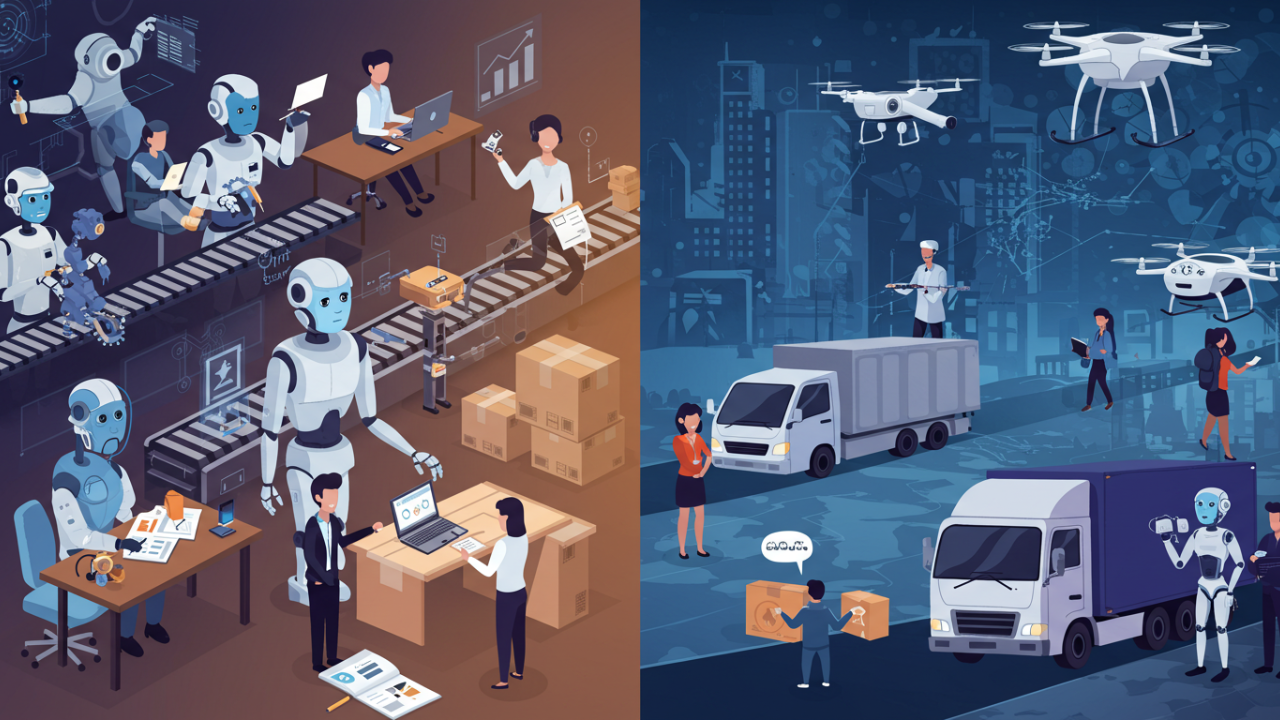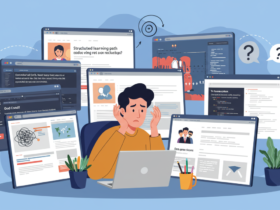Advertisement
Intro of Will AI steal your job? Future-proof careers in 2025
The rise of AI and its growing influence in the workplace has raised worry for a lot of people. Most people are now asking: Is my job at risk because of AI? With the progress of artificial intelligence technology, it seems that most functions previously performed by people will be automated.
But how valid is this fear? Is it true that robots will eventually dominate all employment opportunities, or is there a way to safeguard one’s career?
This text aims to analyze the impact of AI on the job market while providing information on how to protect your career from automation. Additionally, we will identify the jobs that will most likely endure future advancements by 2025, outlining the steps for staying ahead.
What is AI and How Does It Affect Your Job?
Understanding AI and Its Capabilities
Moving straight to the question of whether AI could take over certain jobs, we first need to define artificial intelligence as well as the ways in which it is currently utilized across sectors.
How AI Works
-
Automation: The most prominent strength of AI is automation. AI systems, by design, relieve human workers of responsibility for mundane and repetitive tasks.
-
Machine Learning: AI has the ability to enhance itself over time, through a process called machine learning. The more data the AI is fed, the more accurate its decisions and predictions will be.
-
Natural Language Processing (NLP): AI has the capability to comprehend and interpret human language. AI is, therefore, well-suited for writing, content development, customer support functions, and many other similar roles.
So, what are the implications for your occupation? In fields where data-heavy work or repetitive task completion is involved, AI stands ready to take over. Conversely, jobs that demand emotional intelligence, creativity or sound judgment are much more difficult for machines to assume.
Jobs Most Likely to Be Replaced by AI
Which Jobs Are at High Risk of Automation?
While AI is a formidable tool, it was never intended to take on every job. Certain roles, especially those that have monotonous tasks or follow predictable patterns, are at greater risk of automation.
Manufacturing and Manual Labor
AI and robotics have already changed the face of manufacturing. Robots are capable of working without rest and performing tasks like assembly, welding, and packaging or packing with perfect precision. As technology progresses, numerous manufacturing positions will be replaced.
For example, assembly line workers, factory laborers, and a few quality control personnel.
Office Jobs and Data Entry
Some of the most readily automated positions are simple administrative positions or those revolving around systematic data entry. These roles include docment review, data entry, and even bookkeeping since AI systems can process massive amounts of data quicky and with great accuracy.
For example, data entry clerks, administrative assistants, and repetitive office managers.
Retail and Customer Service Jobs
With the rise of more sophisticated AI, chatbots and virtual assistants are replacing customer service roles. AI is capable of answering questions and processing orders while solving normal issues without any human intervention. In retail, the self-checkout machines are replacing cashiers.
For example, call center representatives, retail cashiers, and customer support representatives.
Transportation and Delivery
The future of transportation lies in autonomous vehicles. Self driving trucks, delivery drones, and even robotic delivery machines are being tested currently and will soon become more mainstream. This will make the use of drivers and delivery personnel unnecessary.
For example, delivery drivers, taxi drivers, and truck drivers.
Creative Industries
AI is now capable of creating art, composing text, and designing templates. While AI cannot replicate true human creativity, it is extremely proficient at producing aesthetically pleasing work at a fraction of the time. The most creative industries have a stronger defense, because they require complex reasoning and discerning understandings.
Illustrations: Content producers, basic music composers, and entry level designers.
Jobs That Are Less Likely to Be Replaced by AI
What Careers Are Future-Proof in 2025?
AI is expected to take over some professions, but most people will continue to work in areas deemed essential. These roles are balanced through social creativity, emotional judgment, human evaluation, and multi layered reasoning, which pose challenges for AI.
Jobs That Require Human Emotional Intelligence
Filling the gap of AI efficiency is human emotional intelligence, and that is the advantage we still have. Professions needing compassion and understanding are safer than most when it comes to automation.
Healthcare
- Healthcare professionals such as doctors and nurses exercise a great deal of compassion, and intelligent reasoning. While diagnostics can be aided with the help of AI, the foundational components of healthcare are irreplaceable.
-
Examples: Healthcare professionals, nurses, therapists, and mental health specialists.
Social Workers
- Social work touches on the development and management of the emotional and social requirements of an individual, frequently in a stressful or crisis situation. AI can do secretarial work, but compassion will always and only come from a human being.
-
Examples: Social workers, counselors, and family therapists.
Customer Relationship Management
- Jobs that require deep human empathy and sophisticated interpersonal problem-solving will likely remain in human hands. AI can manage simple queries, but complex or sensitive questions will require human assistance.
-
Examples: Relationship managers, HR specialists, and sales personnel in full-service customer care.
Jobs Involving Creativity and Problem-Solving
Creative processes can benefit from the assistance of AI, but true creativity, intuition, and thinking outside the box is distinctively human. Jobs with unique creativity or innovative solutions will remain safe.
Writers, Designers, and Artists
- Although capable of producing content, AI continues to lag behind humans in storytelling, emotion, design, and advanced creativity. Work requiring high-level creativity will be more difficult for AI to take over.
-
Examples: Writers, visual artists, graphic designers, and musicians.
Strategic Business Roles
AI can conduct data analysis, but cannot make strategic decisions. There is still a need for professionals who are skilled in utilizing data, tracking market activities, and formulating plans to steer the business into the desired direction.
Business consultants, marketers, and entrepreneurs are a few professionals who would fill these roles.
Highly Skilled Technical Roles
Due to the recent innovations in technology and AI, there is an increased need for professionals who can create, operate, and enhance systems. If you’re equipped with skills in software engineering or AI related disciplines, chances are, you’ll face less threat from automation.
AI Developers
Experts responsible for constructing AI systems and related technology, like machine learning models, will experience increased growth. Overall, the need for AI specialists is bound to rise.
AI developers, machine learning engineers, and data scientists are a few examples.
Cybersecurity Experts
The amplified growth of cyber risks will increase the need for cybersecurity personnel. While AI can assist in identifying risks, human discretion is crucial in navigating sophisticated security dilemmas that require elaborate reasoning and effective responses.
Cybersecurity specialists, security analysts, and ethical hackers are examples of this role.
Data Scientists and Analysts
Employing data as a resource is becoming more popular in most organizations, and so is the need to have professionals available who can provide insightful analysis. Data lack intelligence until a human’s expertise is introduced into the equation.
Such include: data analysts, business intelligence specialists, and statisticians.
Skilled Trades
Careers in physical work or manual problem-solving are still less exposed to automation and AI compared to other job sectors.
For instance: Electricians, plumbers, construction workers, and carpenters.
Skills That Will Keep You Competitive in 2025
How to Future-Proof Your Career Against AI
The work paradigm will shift with the onset of artificial intelligence; however, you can take specific actions to protect your career. Here’s what to do:
Adaptability and Lifelong Learning
To remain relevant within the workforce, one has to be adaptable, given that AI and automation are developing at an astonishing pace. However, the fastest way of advancing is acquiring new skills regularly.
Suggestion: Consider enrolling in courses related to data science, AI, or coding, regardless of their relevance to your current job.
Embrace Technology and AI Tools
You may not be as vulnerable when it comes to being replaced in your position; nevertheless, you have the ability to substantially increase productivity with the employment of AI. Mastering AI tools can boost your position within the industry.
Suggestion: Utilize chatbots for customer support, AI programs for content generation, or automation software for repetitive tasks and watch your productivity soar.
Focus on Human Skills
Competence in the use of tools and systems is crucial, but emotional intelligence (EQ), critical thinking, and other forms of human skills are equally important in today’s world. No matter how advanced artificial intelligence becomes in automating computational tasks, it cannot replicate genuine human judgment, creativity, and empathy.
Take note: Concentrate on developing your communication, problem solving, and emotional intelligence skills.
You can also read Best no-code AI tools to build apps without coding
Top Future-Proof Careers for 2025
The Careers to Watch in 2025
With advances in AI technology, it is clear some professions will remain in high demand due to their unique human touch:
Healthcare Careers
-
Mental Health Professionals: There is a clear gap in the availability of mental health services, and therapy requires a significant amount of human connection which cannot be replaced by AI.
-
Medical Technology: Careers in the medical field will flourish in surgical robotics, biotechnology, diagnostic imaging, and more due to innovation in medical technology.
Technology and Engineering
-
AI Specialists: As AI technologies become more integrated into everyday life, professionals who develop and maintain AI systems will attract tremendous demand.
-
Software Engineers: The market will continue to boom in machine learning, AI, and general computing because of the necessity of software development and programming.
Renewable Energy and Environmental Jobs
-
Green Energy Technicians: Solar, Wind, and Energy Efficiency Technicians: Job opportunities will flourish with the global transition towards green energy.
Education
-
STEM Teachers: With the advancement of technology comes the urgency for new science and math teachers.
-
Corporate Trainers: Businesses will increasingly require professionals who will prepare employees to work with new skills, technologies, and methodologies.
My Opinion| Will AI Steal Your Job?
There is no denying AI is reshaping the world of work, but it will not take over all jobs. Positions that involve human emotions, creativity, and strategic thinking will continue to be in demand. By adopting new technologies, reskilling, and pivoting to human contact roles, you can secure your career for the years to come.
Keep in mind, the goal isn’t about being frightened of AI but learning how to embrace it. Stay inquisitive, be proactive in learning, and always prepare for what lies ahead in your career.













1 Comment
View Comments